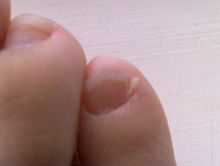Accessory nail of the fifth toe

The accessory nail of the fifth toe is a physical trait of the small toe, where a minuscule "sixth toenail" is present in the outer corner of the nail situated on the smallest toe.[1] It is commonly perceived to be especially prevalent amongst Han Chinese;[1] however, this is partially due to legend, and is not entirely medically proven.
Trait
The trait can be observed on either one or both feet, where there is a separation of the toenail situated on the smallest toe. The separated part of the nail forms a smaller "sixth toenail" on the corner of the larger, or "main" section of the toenail, on the outermost side of the foot, which protrudes outwards from the corner of the larger nail. The additional "nail" can be cut with a nail clipper, just like any other nail.
Perception
The trait is commonly perceived to be widely present among Han Chinese, although this has not been medically proven. It is also present in other ethnic groups, such as caucasian.
Legend
Chinese mythology follows that during the time of the Yellow Emperor, there were two types of people living in China, those who were the descendants of the Yellow Emperor, and those who were nomadic Qiang people. As the Henan people attacked the Qiang, led by Yin Wang, they abducted a Qiang woman, who later tried to escape. After Yin Wang stabbed her in the abdomen as she tried to escape, she gave birth to two children with a scar on the small toe of the foot. The children were taken back by Yin Wang for adoption, and their descendants became born with double nails on their small toes.[2]
See also
- Mongoloid
- Dominance (genetics)
- Mongolian spot
- Epicanthal fold
See also
References
- ↑ 1.0 1.1 Chi, CC; Wang SH (August 2004). "Inherited accessory nail of the fifth toe cured by surgical matricectomy". Dermatologic Surgery 30 (8): 1177–1179. doi:10.1111/j.1524-4725.2004.30351.x. PMID 15274716.
- ↑ 关于小脚趾两瓣趾甲的传说 ("Regarding the myth of the double toenail")